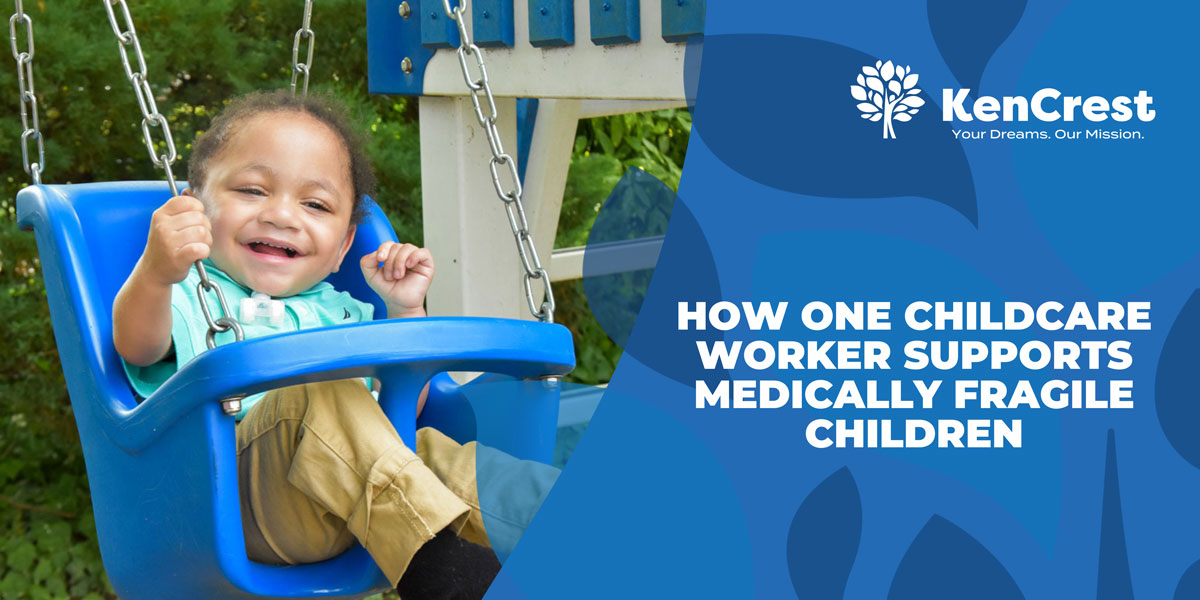
A medically fragile child playing on the swing set at one of KenCrest's Children's Transitional Medically Fragile Homes. // Photo by Aubrey Hoffert
KenCrest Childcare worker Siani Johnson spent the past three years supporting children with complex medical needs.
By Sydney Kerelo

Photo of Siani Johnson
Since she was young, Siani Johnson has dreamed of working with children in the medical field. She wanted to help them thrive, watch them grow, and overcome any challenge.
And three years ago, that dream became a reality when she started working at KenCrest.
In February 2021, Johnson began working as a childcare worker within one of KenCrest’s Children's Transitional Medically Fragile Homes, which supports children under two years old with complex medical needs requiring 24/7 skilled nursing care.
“Medically fragile children sometimes need medical equipment to keep them alive,” writes Care Options for Kids. “Some may require a skilled nurse to constantly monitor their heart rate or breathing. Others need to be hooked to a ventilator or be fed intravenously. They may need continuous physical therapy, a urinary catheter, or orthotics.”
Many of the children within KenCrest’s homes that Johnson works with have tracheotomies, central lines, oxygen and feeding tubes, chromosomal disorders, and neurological conditions.
The two Children's Transitional Medically Fragile homes KenCrest operates started in 1991 and are designed to offer exceptional care to infants, toddlers, and young children with medically complex needs. Each home requires nurses, physical therapists, occupational therapists, speech-language pathologists, social workers, and childcare workers to work in the homes daily.
As a childcare worker in one of these homes, Johnson doesn’t just watch the children; she frequently cleans the home, toys, and equipment with proper disinfectant. She practices developmental activities with them or works on their fine motor skills while ensuring each child is happy, healthy, and safe.
RELATED: How KenCrest Helps Medically Fragile Children
“I love working in a medically fragile home because they are so important for children with disabilities,” says Johnson. “I like to think that transitional homes give the parents some relief knowing their children are in a comfortable setting getting the care they need and deserve.
“I also believe the parents are more comfortable learning how to care for their children in our home rather than the hospital,” she adds. Medically fragile homes are a stepping stone for children with complex medical needs as their parents prepare to transition them home. They are designed to offer support in a comfortable environment instead of a hospital where they can have toys and be surrounded by friendly, warm people who are there day in and day out. Here parents learn from skilled staff the proper ways to support their children while they prepare for their transition home to their families.
Since starting at KenCrest, Johnson has developed several close relationships with the children she supports, but one child in particular has profoundly touched her heart.

Children playing with bubbles at KenCrest's Children's Transitional Medically Fragile Home. // Photo by Aubrey Hoffert
“I’ve developed one of the strongest bonds with who I think is the sweetest baby ever,” says Johnson. “He loves music, so we listen to music from the start of the day while I work on his care. Then, once all the children are in the playroom together, we sing our good morning song to get our bodies moving.”
Afterward, Johnson helps this child develop his fine motor skills by working with a peg board or doing developmental activities like puzzles and sensory activities.
“Childcare workers are so important because we keep the houses running, we keep them clean, we feed the children who eat by mouth, practice specific skills with them, and we assist the nurses with anything that falls within our responsibilities,” says Johnson. “We are the closest person to the kids, and we develop such a strong bond with each and every one of them.”
Johnson still loves her work three years later and inspires others to work within a Children's Transitional Medically Fragile Home.
